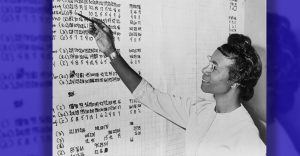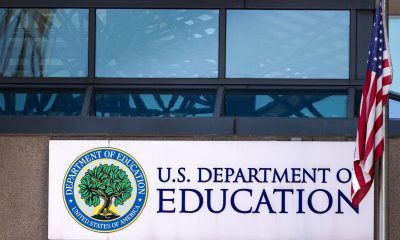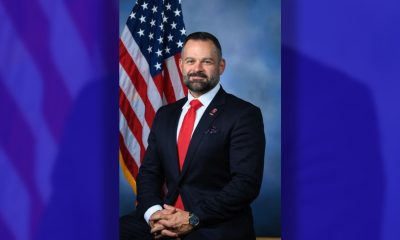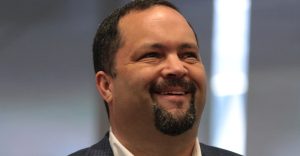Health
U.S. Court Halts Contentious Law on Contact Lens Price-Fixing

A contact lens is shown in front of a 1-800-Contacts shipping box Wednesday, May 13, 2015, in Salt Lake City. A law banning price-fixing for contact lenses that took effect this week in Utah is a setback for the nation’s largest manufacturers that could have ripple effects across the country amid an increasingly bitter fight with discount retailers. (AP Photo/Rick Bowmer)
Lindsay Whitehurst, ASSOCIATED PRESS
SALT LAKE CITY (AP) — A federal appeals court has halted a new Utah law banning price-fixing for contact lenses that could have wide-ranging implications for the industry amid a fight between manufacturers and discount retailers.
Lens maker Alcon Laboratories cheered the order Thursday. Along with Johnson & Johnson and Bausch & Lomb, the company says the law is an unconstitutional overreach written to benefit Utah-based online discount retailer 1-800 Contacts.
The measure halted by the appeals court would allow 1-800 Contacts, one of the nation’s biggest lens suppliers, to disregard minimum prices set by the manufacturers and sell discount lenses across state lines, according to Steve DelBianco, executive director of the trade group NetChoice.
That would be good for customers because they’d be paying less for their contacts, he says. But the manufacturers argue setting minimum prices protects eye doctors from being undercut.
At stake is control of a roughly $4 billion market with some 38 million American customers.
Many contact lens sales come from eye doctors. But discount retailers have been growing in recent years, and 1-800 Contacts has captured about 10 percent of the national market, according to court papers.
The order issued late Wednesday from the 10th U.S. Circuit Court of Appeals in Denver puts the Utah law on hold as a legal challenge plays out. It reverses a lower court ruling from U.S. District Judge Dee Benson, who found the law is a legal antitrust measure and allowed it to take effect this week.
Utah’s state attorneys declined to comment.
The law targets a pricing program that the manufacturers started using about two years ago. If retailers sell lenses cheaper than the minimum prices, the manufacturers that dominate the market pull their products.
Republican state Sen. Deidre Henderson, who sponsored the measure, has called the pricing minimums predatory and anticompetitive.
Discount giant Costco says the rules forced it to raise prices by more than 20 percent on some brands. The popular Acuvue Oasys brand increased from about $52 for a 12-pack to about $68 last year, according to court papers.
The minimum price rules also have drawn ire elsewhere, sparking 40 class-action lawsuits across the country and scrutiny from Congress since the manufacturers started setting them about two years ago, according to Benson’s ruling. Nine states have considered legislation similar to that passed in Utah.
Henderson said the measure was written to bolster competition rather than help 1-800 Contacts, but he has been vague on whether it will allow Utah-based companies like 1-800 Contacts to sell at discounted rates to customers outside the state. The manufacturers say that would violate interstate commerce regulations.
A constitutional law expert said the law doesn’t appear to violate those rules because it doesn’t give perks to a local company or clash with laws in other states.
But University of Michigan law professor Richard Primus says a provision that allows Utah’s attorney general to sue manufacturers who withhold their product from discount sellers could be on shakier legal ground.
Copyright 2015 The Associated Press. All rights reserved. This material may not be published, broadcast, rewritten or redistributed.
###
Activism
Essay: Intentional Self Care and Community Connections Can Improve Our Wellbeing
At the deepest and also most expansive level of reality, we are all part of the same being, our bodies made from the minerals of the earth, our spirits infused by the spiritual breath that animates the universe. Willingness to move more deeply into fear and pain is the first step toward moving into a larger consciousness. Willingness to move beyond the delusion of our separateness can show us new ways of working and living together.

By Dr. Lorraine Bonner, Special to California Black Media Partners
I went to a medical school that was steeped in the principles of classical Western medicine. However, I also learned mindfulness meditation during that time, which opened me to the multifaceted relationship between illnesses and the interconnecting environmental, mental and emotional realities that can impact an individual’s health.
Therefore, when I began to practice medicine, I also pursued training in hypnosis, relaxation techniques, meditation, and guided imagery, to bring a mind-body focus to my work in medical care and prevention.
The people I saw in my practice had a mix of problems, including high blood pressure, diabetes, and a variety of pain issues. I taught almost everyone relaxation breathing and made some general relaxation tapes. To anyone willing, I offered guided imagery.
“My work embraced an approach to wellness I call “Liberatory Health” — one that not only addresses the treatment and management of disease symptoms but also seeks to dismantle the conditions that make people sick in the first place.”
From my perspective, illness is only the outermost manifestation of our efforts to cope, often fueled by addictions such as sugar, tobacco, or alcohol, shackled by an individualistic cult belief that we have only ourselves to blame for our suffering.
At the deepest and also most expansive level of reality, we are all part of the same being, our bodies made from the minerals of the earth, our spirits infused by the spiritual breath that animates the universe. Willingness to move more deeply into fear and pain is the first step toward moving into a larger consciousness. Willingness to move beyond the delusion of our separateness can show us new ways of working and living together.
To put these ideas into practical form, I would quote the immortal Mr. Rogers: “Find the helpers.” There are already people in every community working for liberation. Some of them are running for office, others are giving food to those who need it. Some are volunteering in schools, libraries or hospitals. Some are studying liberation movements, or are working in urban or community gardens, or learning to practice restorative and transformative justice, or creating liberation art, music, dance, theater or writing. Some are mentoring high schoolers or apprenticing young people in a trade. There are many places where compassionate humans are finding other humans and working together for a better world.
A more compassionate world is possible, one in which we will all enjoy better health. Creating it will make us healthier, too.
In community, we are strong. Recognizing denial and overcoming the fragmenting effects of spiritual disorder offer us a path to liberation and true health.
Good health and well-being are the collective rights of all people!
About the Author
Dr. Lorraine Bonner is a retired physician. She is also a sculptor who works in clay, exploring issues of trust, trustworthiness and exploitation, as well as visions of a better world.
Activism
Prescribing Prevention: Doctors Turn to Lifestyle, Herbs and Veggies to Protect Against Chronic Illness in Black Californians

By Charlene Muhammad, California Black Media
Leibo Glover received his diabetes diagnosis at the same time he found out he needed a below-the-knee amputation.
“Minor,” thought the 63-year-old.
Glover had been self-medicating a toe injury before seeing the doctor.
But while driving from South Los Angeles to Miami on a family trip, an infection set in.
“I had it but didn’t know,” said Glover. “I was just going to come back to California, but they told me if I had left, I would have come home as a corpse,” Glover told California Black Media (CBM).
A majority of the nearly 3.5 million Californians diagnosed with diabetes have preventable Type 2 diabetes, according to researchers at the UCLA Center for Health Policy Research.
In 2023, diabetes was diagnosed in 1 in 6 adults with the lowest incomes (16.7% at 0–99% of the federal poverty line), compared to 1 in 11 adults with the highest incomes (8.9% at 300% or more of the federal poverty line). Age is a factor, too: more than 1 in 5 older adults age 65 and over (22.3%) had diabetes, about twice the rate of adults age 18–64 (8.6%).
Another study by Health Economics and Evaluation Research (HEER) mapped patients with diabetes in California who had amputations. Researchers found that patients living in low-income ZIP codes were far more likely to have had lower-limb amputations than those in higher-income ZIP codes, essentially identifying amputation “hot spots.”
At the time of Glover’s 2018 diagnosis, he was experiencing housing instability and going through financial hardships. Now, he has more stable housing and he has improved his health through lifestyle changes like eating healthier and getting more sleep.
“If the equipment is right, I can stand on my leg for hours. I can actually run, jump, dance and all of that,” said Glover, who got his diabetes under control, in part, by avoiding carbohydrates and sugars.
As chronic illnesses continue to disproportionately impact Black Californians — often leading to preventable amputations and premature deaths — a growing number of doctors and advocates are expanding their care from just treatment to including prevention. From promoting diet and lifestyle changes to cultivating community farms focused on prevention and wellness like Dr. Bill Releford’s Bloom Ranch in Acton.
Releford, a podiatrist based in Los Angeles started the 250-acre Bloom Ranch in 2023 as part of his strategy for preventive care.
“This is my assignment,” said Releford.
“Bloom Ranch has been a perfect backdrop for me to be creative and to find avant-garde ways to make fresh fruits and vegetables more accessible to food deserts in Los Angeles County,” he stated.
California produces nearly half of the nation’s fruits and vegetables, yet more than 1 in 5 Californians — about 8.8 million people — currently struggle with food insecurity, according to the California Association of Food Banks.
“Studies have shown that 75% of amputations are preventable. And African Americans have the highest amputation rate in the nation,” Releford said.
As such, Releford continued, the mortality rate associated with high-level amputation is 50%, which means “if we had 10 people that all had high level amputations, five of those would be deceased in three years.”
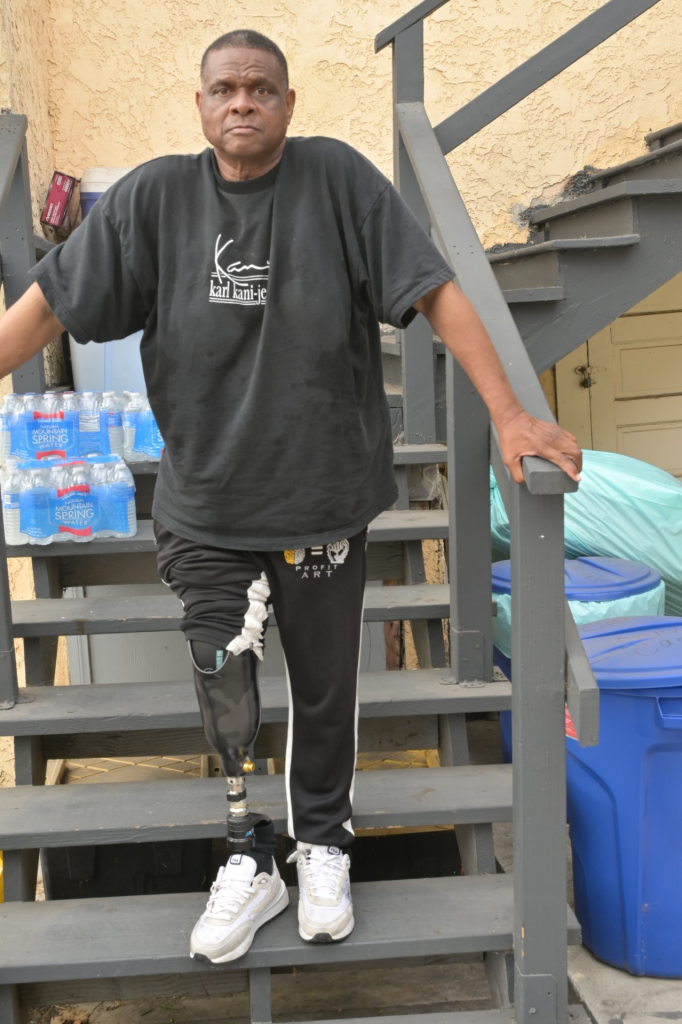
Monday, June 28, 2025. Leibo Glover at his home in Los Angeles, California. The security professional’s leg was amputated below the knee.
Releford’s ranch is the largest Black-owned farm in L.A. County. He plans to partner with UCLA and the Charles R. Drew University of Medicine and Science to develop prescriptive vegetable boxes.
“Certain vegetables and herbs can lower blood pressure naturally, like beets, turnips, dill, basil, garlic and others,” said Releford.
“Hopefully, this will inspire other farmers to take this model and replicate it across other urban areas,” Releford added.
“A lot of studies have shown that gardening has so many health benefits – being in the sun, Vitamin D,” said Releford. “The dirt has a lot of microbes that are good for your immune system. Studies have shown that people who work in the dirt have strong immune systems.”
Gardening can potentially decrease the risk of dementia, enhance cognition, reduce stress, and boost immunity, indicates research by Genoa Barrow of the University of Southern California Center for Health Journalism as part of the 2024 Ethnic Media Collaborative, Healing California.
During a recent picturesque day at Bloom Ranch, families, school children, farmers and members of The Ultimate Book Club 1998, founded by Alina Anderson, sampled and purchased fresh produce while taking photographs.
“This is huge. “All of us have families that could use this information,” said Anderson.
Doctors like Releford, who are committed to tackling the most chronic diseases impacting all their patients utilize peer-to-peer support programs with self-management training led by individuals living with chronic conditions to provide role models and support for patients, according to a recent study by the California Health Care Foundation.
“The unifying feature of these programs is that they seek to build on the strengths, knowledge, and experience that peers can offer,” the report states.
Liz Helms, CEO of the California Chronic Care Coalition, addressed state-backed prevention policy and initiatives.
“It’s in horrible shape. It needs to get so much better, especially in underserved areas, where the Black population has a whole set of different needs,” she said.
Helms, who started advocacy after being denied access to care in the early 1990s, applauded new developments in telehealth. The opportunity to choose between visiting a doctor’s office or placing a phone call makes a difference, especially if there are transportation or distance issues, or if one is too sick, she said.
Fear is one thing people, especially in the Black community, must overcome, emphasized Helms.
“I had to get over my fear of going to the doctor, of not speaking up,” continued Helms, urging patients to “understand the baseline” of their health.
“Don’t let anyone stigmatize you or tell you that you’re not good enough to get care or look down on you. Everyone has a right to good, quality, affordable, timely health care,” said Helms.
To engage Bloom Ranch for preventive care focused on wellbeing and healthy living, call (323) 388-4828 or sign up at Bloomranchofacton.com
Activism
A West Coast CDC? California Partners With Oregon, Washington and Hawaii to Form Regional Health Alliance
“President Trump’s mass firing of CDC doctors and scientists — and his blatant politicization of the agency — is a direct assault on the health and safety of the American people. California, Oregon, and Washington will not allow the people of our states to be put at risk,” said Governors Gavin Newsom, Tina Kotek, and Bob Ferguson in a joint statement.

By Bo Tefu, California Black Media
California, Oregon, and Washington have launched the West Coast Health Alliance, a regional initiative to provide unified, science-based guidance on immunizations and other public health policies. The alliance was created in response to federal actions that have undermined the independence of the Centers for Disease Control (CDC) and raised concerns about the politicization of science.
The alliance aims to ensure residents receive credible, evidence-based recommendations, free from political interference.
“President Trump’s mass firing of CDC doctors and scientists — and his blatant politicization of the agency — is a direct assault on the health and safety of the American people. California, Oregon, and Washington will not allow the people of our states to be put at risk,” said Governors Gavin Newsom, Tina Kotek, and Bob Ferguson in a joint statement.
State health leaders emphasized the importance of transparency and evidence-based communication.
California Department of Public Health Director Erica Pan said, “The dismantling of public health and dismissal of experienced and respected health leaders and advisors, along with the lack of using science, data, and evidence to improve our nation’s health are placing lives at risk.”
Oregon Health Authority Director Sejal Hathi backed the coalition saying, “Our communities deserve clear and transparent communication about vaccines — communication grounded in science, not ideology.” Washington State Secretary of Health Dennis Worsham noted, “Public health at its core is about prevention — preventing illness, preventing the spread of disease, and preventing early, avoidable deaths.”
Hawaii has joined the alliance, expanding the partnership to four states. “Hawaii is proud to stand with our West Coast partners to ensure public health decisions are grounded in science, not politics,” said Gov. Josh Green.
The alliance states will coordinate health guidelines using trusted national medical organizations, aligning immunization recommendations and public health strategies while respecting tribal sovereignty. Shared principles to strengthen public confidence in vaccines and other health measures will be finalized in the coming weeks.
-

 Activism4 weeks ago
Activism4 weeks agoOakland Post: Week of November 12 – 18, 2025
-

 Activism3 weeks ago
Activism3 weeks agoIN MEMORIAM: William ‘Bill’ Patterson, 94
-

 Activism4 weeks ago
Activism4 weeks agoHow Charles R. Drew University Navigated More Than $20 Million in Fed Cuts – Still Prioritizing Students and Community Health
-

 Bay Area4 weeks ago
Bay Area4 weeks agoNo Justice in the Justice System
-

 #NNPA BlackPress3 weeks ago
#NNPA BlackPress3 weeks agoLewis Hamilton set to start LAST in Saturday Night’s Las Vegas Grand Prix
-

 #NNPA BlackPress3 weeks ago
#NNPA BlackPress3 weeks agoBeyoncé and Jay-Z make rare public appearance with Lewis Hamilton at Las Vegas Grand Prix
-

 Activism3 weeks ago
Activism3 weeks agoOakland Post: Week of November 19 – 25, 2025
-

 #NNPA BlackPress4 weeks ago
#NNPA BlackPress4 weeks agoThe Perfumed Hand of Hypocrisy: Trump Hosted Former Terror Suspect While America Condemns a Muslim Mayor

